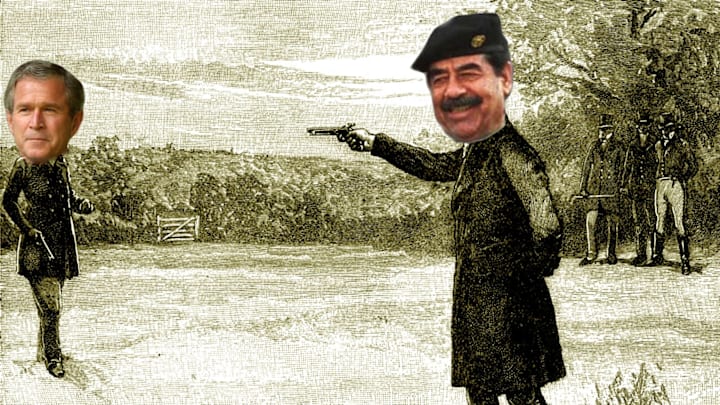In October 2002, the United States government stood on the precipice of invading Iraq. American officials insisted the Middle Eastern country was in possession of nuclear weapons. They insisted that Iraqi leader Saddam Hussein’s reign needed to come to an end. And they insisted that war was imminent.
Taha Yasin Ramadan, one of Iraq’s two vice presidents, offered an alternative solution. Instead of prolonged combat, Hussein and U.S. president George Bush should do battle in a duel.
More specifically, he envisioned a kind of world leader Royal Rumble. “A president against a president and vice president against a vice president and a duel takes place,” Ramadan said. “And in this way, we’re saving the American and Iraqi people.”
Political Duels
Ramadan’s challenge seemed outrageous, yet there was plenty of precedent for it. Duels between contentious parties have a lively history dating back to the Middle Ages, when the winning combatant was thought to be chosen by God as the rightful victor. By the 1800s, the will of a higher power had been supplanted by a formal set of rules that many duelists adhered to. Since most duels were a matter of honor being challenged—or even martial discord—a proper apology could prevent violence. Nor were duels strictly to the death: An impressive wound could settle matters.
As tempers can run hot in politics, it was inevitable that duels would be introduced to try and conclude differences of opinion. Aaron Burr was at the center of two high-profile face-offs. In 1802, Burr’s friend, John Swartwout, challenged DeWitt Clinton over Clinton’s alleged smears of Burr. Clinton, who was wielding a flintlock pistol, wounded Swartwout—then walked off in exasperation after his foe refused to admit defeat. Burr himself would, of course, stare down the barrel of Alexander Hamilton’s weapon in 1804, and end up mortally wounding Hamilton.
Not even the ever-composed Abraham Lincoln could avoid being mired in the occasional challenge. In 1842, Lincoln, then a state senator in Illinois, critiqued state auditor James Shields over the state’s decision to reject paper currency. Under the pseudonym Rebecca, Lincoln took on the persona of an aggrieved housewife and chastised Shields for the decision in a newspaper editorial.
Shields was furious and outed Lincoln as the author of the piece—then challenged him to a duel. The future president tried to sidestep the matter, but still managed to volley a barely-disguised warning to Shields, writing that such an encounter would be of “great regret to me, as it possibly could to you.”
The two actually met near the Mississippi River. Lincoln, being the taller man, took a swipe at a tree branch with his chosen weapon of a broadsword. That was enough for Shields—who realized Lincoln’s reach would likely be the end of him—to back down.
Andrew Jackson was comparatively more bloodthirsty. During a duel in 1806 against Charles Dickinson, Jackson’s pistol misfired, which counted as a shot. But he fired again anyway, killing Dickinson.
The last duel on American soil of note took place in 1859, when California State Senator David Broderick and Chief Justice of the California State Supreme Court David Terry agreed to settle their dispute over slavery with pistols. (Broderick wanted to see slavery abolished; Terry was a proponent who believed Broderick's verbal attacks cost him re-election.) The two met in San Francisco, where Terry shot Broderick in the chest. The senator died three days later.
Changing social mores largely brought an end to dueling by the late 1800s. But, as Ramadan demonstrated, it was not entirely forgotten.
Bush vs. Hussein
Ramadan’s pitch was accompanied by another suggestion: The contest could be officiated by United Nations Secretary-General Kofi Annan, who was presumably deemed an objective party. Ramadan went on to float the idea that one of Iraq’s vice presidents—the other being Taha Mohieddin Marouf—and vice president Dick Cheney would be a reserve duel in case their respective leaders both perished.
“Bush wants to attack the whole Iraq, the army and the infrastructure,” Ramadan said. “If such a call is genuine, then let the American president and a selected group with him face a selected group of us and we choose a neutral land … and both groups should use the same weapon.”
Though it was reported some journalists listening to Ramadan thought he might have been joking, others stated that Iraq’s vice president wasn’t known for his sense of humor. Laith Kubba, an expert in Iraq intelligence, told NPR he believed Hussein would be up for it.
“If it’s thrown at Saddam, I am sure he would respond to it and he would ask for a fight in any form or in any way,” Kubba said. “As far as Saddam is concerned, he has been tested. At least he attempted one assassination, he’s known to be a gangster, and he always refers to the fight with America in a very local word in Iraqi called ‘kona,’ and kona means when one gang fights another gang in [the] streets.”
Alas, what could have been a lucrative pay-per-view event never materialized. Hussein never commented on the proposal, and instead challenged Bush to a live television debate via satellite. White House spokesperson Ari Fleischer declared the idea of a duel an “irresponsible statement” that didn’t “justify a response.” He continued:
“I just want to point out that in the past when Iraq had disputes, it invaded its neighbors … There were no duels; there were no invasions. There was use of weapons of mass destruction and [the] military. And that's how Iraq settles its disputes.”
The U.S. went on to formally invade Iraq six months later, in March 2003. Hussein was captured in December that year, and in 2006, was tried and executed. The U.S. withdrew the last of its troops in 2011, though forces returned in 2014 amid rising insurgency concerns.
